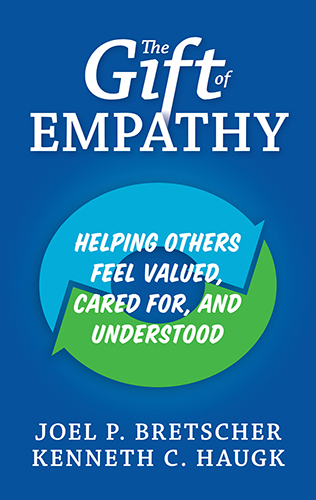Effective caregiving for people with dementia requires lots of empathy, which can seem exhausting on top of all of a caregiver’s other responsibilities. The Gift of Empathy book helps caregivers remain empathic without self-sacrifice.

The Gift of Empathy—Helping Others Feel Valued, Cared for, and Understood by Joel P. Bretscher and Kenneth C. Haugk, PhD, is a book for caregiving families to support one another and enable them to thrive.
What is empathy?
The authors, Bretscher and Haugk define it:
Empathy is looking at the world from someone else’s perspective to experience what the person is feeling—and then expressing your understanding of those feelings to that person.
Showing empathy involves two steps: one, experiencing what the person is saying and two, expressing your understanding of that experience.
Empathy—A Skill to Be Developed
Expressed empathy is a powerful tool to help others feel understood and cared for as they face difficult situations.
Being empathic is a skill. For some, it will require practice to get better. The authors note that while some may listen initially, it’s hard not to want to jump ahead to fix the situation. Yet, they urge the listener to pause before speaking.
What a person really needs is someone to be present and to express understanding. By doing so, the one expressing a painful experience feels cared for and valued. The authors add, that the person, instead of being a problem to be solved, feels like a person to be loved.
Many family caregivers face the challenge of taking car keys away from a person with dementia. For the person who can no longer drive, the realization and shock of losing independence is too much to bear. The authors share an empathic experience told by an adult child whose aging father listed reasons or justifications for each of his many driving mishaps. The child expressed understanding as the father shared what driving meant to him, from racing a go cart to driving a truck. Feeling valued and cared for, the father willingly gave-up his keys.
Empathy—The Valuable Gift that is Free
Empathy costs nothing; yet, in empathizing, we give a valuable gift to another. It requires only that we are present and able to convey our understanding of another’s experience. We don’t even have to agree with the person, we simply acknowledge the person’s experience. In doing so, we create a valuable connection.
The book contains many examples of empathic gifts that help others feel understood. Sharing one’s painful experience to an empathic listener helps release the feelings of awkwardness and pain. People who feel cared for have the strength to move on.
The authors discuss specific relationships in each chapter including one’s spouse or significant other, children, parents, siblings, friends, and people at work.
Another chapter features random acts of empathy with strangers. Sometimes, the results can be profound. For example, a woman tells the story of turning quickly and bumping into another in a coffee shop. Both spill their coffees. While waiting for their replacement coffees, they talk and later grow into best friends.
We often think we don’t have enough energy to empathize and yet it takes so little for such a big effect. The authors provide guidelines to help people empathize without feeling burdened. Instead, the result of empathy is greater energy felt by both parties.
Empathy can even have a magnified beneficial effect in the workplace. The boss, co-worker, or support person will remember your compassion and kindness. While hugs in the workplace may require permission, verbal hugs don’t. Take the opportunity to show another that you understand what they are sharing or the pain they are feeling. It only takes a minute or three. And knowing someone understands and cares, prevents potential hours, days, and weeks of living alone in pain.
Empathy for Personal Growth
Authors, Bretscher and Haugk, write:
Practicing empathy brings personal growth… You’ll gain communication and relational skills, learn to better recognize and understand others’ perspectives, become less judgmental and more caring, and grow in other ways. The effects will touch all aspects of your life and relating.
Empathy is a gift for others and yourself. The more you empathize, the more it will become your natural way of relating, enriching your own life and the lives of everyone around you.
For more information and to get your own copy, visit the Stephen Ministries publisher website.








